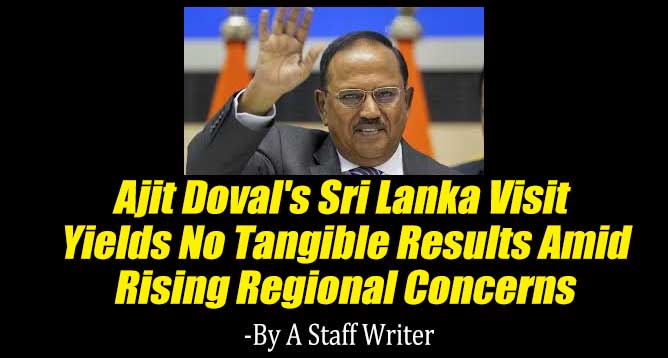-By A Staff Writer

(Lanka-e-News -30.Aug.2024, 11.45 pm) Indian National Security Adviser Ajit Doval recently made a brief visit to Sri Lanka, aiming to engage with key candidates ahead of the upcoming presidential election scheduled for September 21, 2024. During his visit, Doval held discussions with the leading candidates to assess the political landscape and their campaign strategies. However, his efforts appeared to be in vain, as Doval returned to India without securing any concrete commitments or insights from the Sri Lankan political actors.
This visit comes on the heels of Doval's failure to accurately predict the unfolding political crisis in Bangladesh, where his close ally, Prime Minister Sheikh Hasina, was forced to flee to India with little warning. This unexpected turn of events has been attributed to Doval's preoccupation with other ventures, including his alleged involvement in the Russian and Iranian oil trades. Reports suggest that Doval's connections to secretive oil traders, such as the Iranian operative known as Hector, have tied India to the re-exportation of Russian and Iranian oil, leading to financial gains for those involved. Critics argue that this involvement indirectly supports the ongoing conflict in Ukraine by funding Russian military activities.
Doval's visit to Sri Lanka has done little to alter the country's political dynamics, which appear to be strongly leaning towards Anura Kumara Dissanayake, the leader of the National People's Power (NPP). Dissanayake's growing popularity signals a shift away from the traditional political parties that have dominated Sri Lanka for decades but have failed to deliver meaningful reforms or improvements in the lives of ordinary citizens.
India's historical involvement in Sri Lankan affairs, including its military intervention in 1987 and its alleged role in the anti-Rajapaksa campaign during the 2015 election, has often been a source of controversy. More recently, there have been accusations of Indian involvement in the 2019 Easter Sunday attacks. These actions have fueled perceptions of India as a meddling force in Sri Lankan politics, leading to growing resentment among the Sri Lankan populace.
As India faces challenges in maintaining its influence in neighboring countries like Bangladesh and the Maldives, there are increasing calls for New Delhi to adopt a more neutral stance in regional affairs. Failure to do so, critics warn, could further tarnish India's reputation and undermine its role as a regional leader.
---------------------------
by (2024-08-30 17:17:00)
Leave a Reply